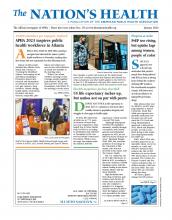
Tractor-trailers line up to enter Portsmouth Marine Terminal in the Port of Virginia, part of Hampton Roads.
Photo by Halbergman, courtesy iStockphoto
The Hampton Roads area on the Chesapeake Bay in southeast Virginia is a tapestry of low-income communities of color bordered byshipyards.
Busy traffic corridors, industrial factories and tractor-trailers hauling goods to and from the Port of Virginia’s four marine terminals are everywhere, according to Garry Harris, PhD, MSc.
Harris, who spoke at APHA’s 2023 Annual Meeting and Expo in Atlanta, grew up in Hampton Roads and suffers from chronic asthma.
“All day long, you are breathing air pollution without knowing it,” he said.
Across the U.S., low-income, marginalized communities are disproportionately exposed to health-harming toxins, often a legacy of redlining and systemic racism, said Harris, an APHA member and managing director of the Center for Sustainable Communities in Atlanta.
The center is documenting environmental health injustices in U.S. communities and creating a strategic plan. Input from community members on their lived experiences is a key component.
“Rarely does anyone try to quantify these impacts and put together a plan to address them,” Harris said.
April Ballard, PhD, MPH, assistant professor of environmental health at Georgia State University’s School of Public Health, is focused on environmental justice for people who are homeless. Among the daily dangers that people who are unhoused face are air pollution, contaminated water and noise pollution, Ballard said.
Ballard called for more public health workers to do assessments of their local unhoused population and to include them in decision making, which can lead to policies and approaches that improve lives.
One way for people of color who are exposed to environmental dangers to make a difference is to exercise their voting rights during elections, according to Fenika Miller, MBA, deputy national field director for the Black Voters Matter Fund.
In 2021, the fund launched “Block Is Hot,” a 19-city Georgia tour that organized block parties in underrepresented communities. Entertainment was offered between speakers that informed people about environmental issues. Community members learned how policy issues affected them, enabling residents to be more active politically and informed about positions of election candidates.
One community aided by the organization was able to lower its electric bills, which for some households were as much as $1,000 a month, by presenting objections to city leaders. Other communities have taken action on clean air issues.
For more information on environmental justice, visit www.apha.org/environmental-justice.
- Copyright The Nation’s Health, American Public Health Association









